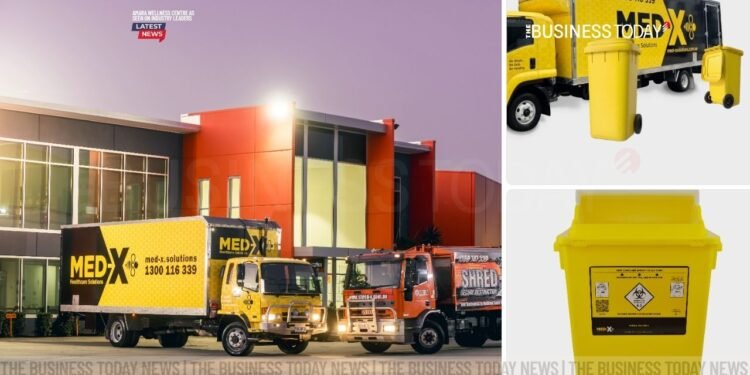By: The Editor
The Business Today News
When the team at Industry Leaders turned the spotlight on Med-X Solutions in a recent episode, viewers were treated to more than just a waste-disposal company story. Instead, they were offered a snapshot of how one firm in Australia is trying to turn an often-overlooked corner of the health-services market into a platform for operational excellence, regulatory confidence and incremental innovation.
A quick‐look profile
Med-X Solutions describes itself as “the medical and biosecurity waste management and hygiene solutions specialist.” Med X Solutions+1 Its service suite spans clinical waste disposal, sharps container systems, feminine-hygiene and sanitary-bin services, wash-room products and biosecurity/quarantine waste. Med X Solutions+1 The company holds licences for transport and waste-facility compliance, and is certified to ISO 9001, ISO 14001 and ISO 45001 under an integrated management system. Med X Solutions+1
Founded (or at least formally registered) in 2017 (ABN 35 141 490 717) in Queensland, Med-X is a relatively young company in a mature industry, but it emphasises having “over 20 years’ industry experience” via its group affiliations. Med X Solutions+1
Why this matters: industry context
Clinical and related waste is increasingly under regulatory and reputational pressure. Healthcare services, veterinary clinics, research labs and aged-care providers all face more rigorous controls around waste segregation, sharps management, cytotoxic disposal and infection-control. In this context, firms like Med-X can position themselves not just as service providers, but as compliance partners.
Indeed, the Med-X website highlights its capacity to manage “cytotoxic, pharmaceutical & anatomical waste disposal” and to hold EPA transporter and facility licences — enabling it to issue waste-transport certificates on behalf of its clients. Med X Solutions This deeper value proposition is the kind that can help differentiate in a market where basic service is increasingly commoditised.
What the television feature highlighted
On Industry Leaders, Med-X emphasised several key themes:
- Customisation over “one-size-fits-all” – The company talked about tailoring waste-management schedules, container sizes, service frequencies and wash-room hygiene support to client-specific volumes and facility-types (e.g., aged-care, research labs, clinics).
- National infrastructure and reach – Although headquartered in Australia, Med-X underscores its state-wide coverage across New South Wales, Queensland, Victoria and more. Med X Solutions+1
- Sustainability and product innovation – While disposal services dominate the narrative, Med-X is signalling that product systems (such as its “EZ range” sharps technology) and hygiene equipment add value and may drive higher margins. Med X Solutions
- Compliance and trust – Emphasis was placed on regulated vehicles, licencing and accurate reporting (including weight-based billing and documentation) — crucial when many clients face audits or regulatory oversight.
Key strengths and strategic advantages
- Regulatory moat: By holding EPA transporter/facility licences and detailed ISO certifications, Med-X reduces risk for clients who must meet state and territory waste-management laws. This gives it a credibility edge.
- Service breadth: The company doesn’t just collect clinical waste; it extends into hygiene services, wash-room product supply and sanitary disposal — creating more touch-points in a client’s facility.
- Custom solutions mindset: In sectors like aged care or research labs, waste-profiles differ greatly. A firm that adapts schedule, container size or waste-type mix can capture more value.
- Growing tailwinds: With heightened focus on infection control (especially post-COVID-19), quarantine/biosecurity waste and environmental accountability, demand for specialist disposal and hygiene services is likely rising.
Challenges and caveats
- Commoditisation risk: At the basic level, waste-collection is a recurring service and subject to churn, pricing pressure and logistics costs. Without product or value differentiation, margins may compress.
- Scale & infrastructure costs: National service coverage means capital expenditure – trucks, vehicles, licensed facilities, labour — which must be optimised to avoid margin erosion.
- Service risk: Waste disposal has reputational and regulatory hazards. Missteps (e.g., mis-segregation, transport accidents, compliance failures) can hit client trust and brand.
- Innovation pipeline: While Med-X mentions product development, it remains to be seen whether the firm can move beyond service-provision into higher-margin product or value-added offerings that materially shift the business model.
Strategic outlook
Med-X’s positioning suggests a triple opportunity: increasing the number of clients (green-field), upselling additional hygiene/wash-room services to existing customers, and differentiating via product solutions (sharps, specialised bins, biosecurity waste). If effectively executed, this platform could widen margins beyond pure logistics.
The television feature also helps bolster the brand’s business-leadership credibility, potentially aiding large-facility contracts (e.g., aged-care groups or multi-site health organisations) that look for reputable and compliant partners.
Final take
Med-X Solutions offers a compelling example of a niche specialist service business playing to structural tailwinds in the Australian healthcare/hygiene sector. It is less glamorous than biotech or digital-health startups, but arguably more grounded: regulation-driven, recurring-revenue oriented, and mission-critical for clients.
For investors, facility-operators or supply-chain partners, the question isn’t whether such services are needed — they clearly are. The question is how well a company like Med-X can deliver reliably, scale efficiently, differentiate meaningfully and protect margins.
In short: Med-X is a business worth watching — because in waste and hygiene services, boring often means dependable … and dependable is increasingly rare.









